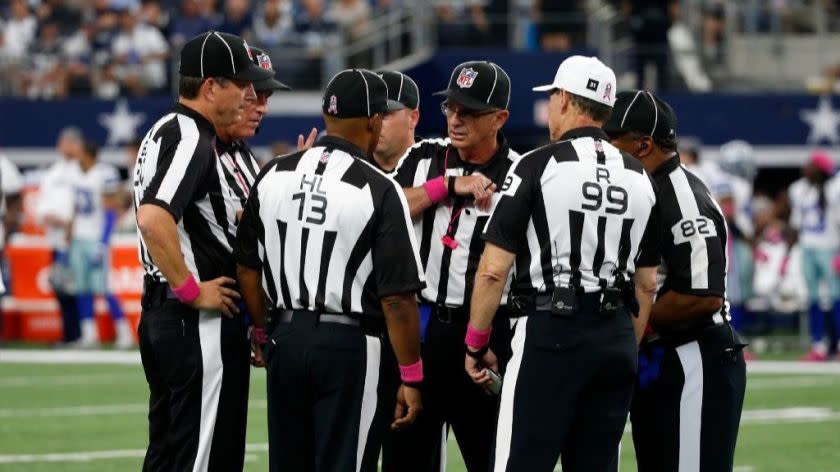NFL offense is up, and it could be the result of something dramatic we're not seeing

One month into the NFL season and there are two ways of looking at the results.
Offenses are scorching, off to a historic scoring start.
Defenses are dumpster fires.
Entering Monday, teams had scored 3,151 points, already the most through the first month of any season in the Super Bowl era.
While there are lots of factors — including innovative offensive coaches, the increasing popularity of mobile quarterbacks and defenses still playing catch-up after a summer without exhibition games — a huge element is something we aren’t seeing: yellow flags.
Penalties have dropped sharply this season, and offenses are reaping the benefits.
The most up-to-date numbers available Monday were through the first three weeks of the season. There was a combined average of 13.65 penalties per game, down from an average of 18.54 through the same stretch last season. An average of five fewer penalties per game is a seismic shift in a league in which every tiny variation is scrutinized.
The numbers dropped more in Week 4, with an average of 10.77 penalties through Sunday. Without question, officials are keeping their flags in their pockets.
The Rams had one penalty in Sunday’s victory over the New York Giants. Philadelphia had three in Sunday night’s win at San Francisco.
And, even though Pete Carroll coaches his players to hit through the echo of the whistle and err on the side of being more aggressive, Seattle had zero penalties in beating Miami.
Some of the penalty breakdowns are more telling. For instance, through the first three weeks of last season, there were 235 calls for offensive holding. Over the same span this season? Ninety-four.
That jaw-dropping number is somewhat skewed because it was a point of emphasis to flag holding last season even if it occurred on the back side of the play, away from the ball, but it’s still a dramatic difference and one that unquestionably changes the game.

Another example: There were 31 offensive pass interference calls through three weeks last season, yet only 18 this season.
The NFL already gears its rules to promote scoring. If offensive linemen are allowed to hold, thereby giving quarterbacks more time to find open targets, point totals are going to climb — up 12% through the first three weeks — and defenses are going to look increasingly inept.
“We’re setting a new standard for what a foul looks like,” said Fox rules analyst Mike Pereira, the NFL’s former director of officiating. “I’m not complaining about it. I kind of like it, to tell you the truth. But never before going into the season have you had the officiating department say to the officials, 'Hey, make all your calls clear and obvious.’ ”
In other words, be even more mindful about throwing a flag. Make sure that penalty is a textbook violation.
Pereira said the NFL emphasized that because there are 11 new officials this season, and they didn’t have the benefit of either a preseason or in-person clinics.
“It’s hilarious if you look at social media, because the tone is usually there are too many penalties being called,” Pereira said. “Now what you’re seeing on social media is people saying, 'They’re not calling enough fouls.’ I’m not sure where the happy medium is.”
There is one constant. Fewer penalties or more penalties — in the eyes of their many couch-bound critics — NFL officials are always doing it wrong.
Goodell threatens forfeits
Faced with a COVID-19 outbreak among the Tennessee Titans last week, and positive tests that led to the postponement of two games, the NFL is doing everything it can to save the season.
Underscoring that, commissioner Roger Goodell warned teams Monday of even harsher penalties for those who fail to adhere to the league’s health and safety guidelines — including the possible forfeiture of games.
“The consequences of rescheduling or even missing games are obvious,” Goodell wrote in a two-page memo to teams. “Our fans will be deprived of games. Competitive inequities will be introduced into our season. Players will not be paid for games not played and clubs will similarly suffer financial consequences.”
Several coaches have been fined $100,000 each for improper use of face coverings, and their clubs were fined $250,000. After an unauthorized team employee was allowed into the Las Vegas Raiders locker room after a game, the club was fined $50,000. And, according to the Associated Press, 10 Raiders players were fined a total of $175,000 on Monday for appearing at a function where face coverings were not used and social distancing not observed.
“Protocol violations that result in virus spread requiring adjustments to the schedule or otherwise impacting other teams will result in additional financial and competitive discipline,” Goodell wrote, “including the adjustment or loss of draft choices or even the forfeit of a game.”
Among the enhanced safety protocols the league is implementing:
Bans on gatherings outside of the club facility.
Limitations on the number of tryouts permitted per week.
Implementation of a league-wide video monitoring system to make sure players and staff wear face coverings while at the facility and traveling.
The league also is considering holding all meetings virtually, mandating masks or face shields during practices and walk-throughs, and reducing time spent in lunchrooms and locker rooms.
Sweet 16
The Seahawks are 4-0 for the first time since 2013, when they went on to beat Denver in Super Bowl XLVIII.
Russell Wilson has thrown 16 touchdown passes. That ties Peyton Manning, quarterback of those 2013 Broncos, for the most in the first four games of a season.
This story originally appeared in Los Angeles Times.

